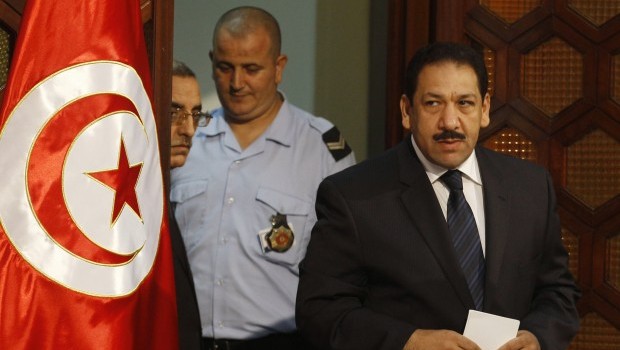
Tunisia’s Interior Minister Lotfi Ben Jeddou (R) arrives for a news conference in Tunis August 28, 2013. (Reuters/Zoubeir Souissi)
The Tunisian Prime Minister, Ali Larayedh, publicly labeled Ansar Al-Sharia as a terrorist organization on Tuesday.
Larayedh accused the Islamist group of being responsible for the killing of Chokri Belaid and Mohamed Brahmi—two secular opposition politicians. The Tunisian premier also linked the group, which translates as ‘supporters of Shari’a,’ to the deaths of many other Tunisians, including the eight soldiers that were killed on July 29.
The murder of Belaid last February caused the collapse of the government of Hamadi Jebali, a leading figure of Islamist Ennahda Movement, while the killing of Brahmi resulted in a political crisis ending with calls for the dissolution of the Constituent Assembly and the resignation of the government.
Speaking at a press conference on Tuesday, Larayedh said Tunisia has declared Ansar Al-Sharia a terrorist organization. Larayedh said his government would not resign and that Ennahda would not accept a caretaker government, calling for what he called “an elections’ government.”
Leader of the Ennahda Movement, Rachid Ghannouchi’s, speaking on Tunisian private channel Nesma TV two days ago, made comments agreeing with Larayedh’s position on the government in Tunisia.
Larayedh also called for the Constituent Assembly to continue the work it was elected for, especially the redrafting of the constitution. He said it was wrong to limit the work of the Constituent Assembly to constitutional matters, calling for the ratification of more than 60 laws that are designed to help employment and development.
Larayedh added that the presidency of the republic was an institution capable of bringing political adversaries together, calling for it to be preserved. This was done without specifically mentioning President Moncef Marzouki, who was given a choice by Ghannouchi to either resign, leaving him to run for president in the next elections, or stay as president without running in the elections.
Larayedh denied opposition accusations that the current government was effectively an Ennahda Movement government and that the movement was in control of the members of government. He cited figures showing that 60 percent of the Tunisian government of 27 ministers and 10 state secretaries were independent who were not under the authority of Ennahda, and the movement only participated with 26 percent of ministers and 10 percent of state secretaries, in addition to the fact that the four major ministries were independent.
Larayedh said he did not think taking to the streets would solve political disagreements, and called on all political parties to resort to dialogue and look for a joint solution to the crisis without compromising Ennahda Movement and its political future.
Meanwhile, Mabrouk Karchid, leading opposition figure, told Asharq Al-Awsat that Larayedh had deliberately sidelined the role of the Tunisian labor union. He added that Larayedh excluded the union from the political equation, which showed that Ennahda no longer feared the Egyptian scenario.
Karchid added that this was a result of a number of secret agreements reached by leaders of Ennahda recently during visits to France, Qatar and Turkey. He also added that the new tactic employed by Ennahda during this period, considering that a descent into street confrontations with the opposition would be a “red line.”
Meanwhile a Tunisian security source said that Saifullah bin Hussein—who leads Ansar Al-Shari’a and is also known as Abu Iyaad—managed to flee Tunisia. The security official explained that special forces had carried out 20 raids in an effort to catch the leader of the Islamist group, but none had led to his arrest.
Speaking at a press conference on Wednesday, interior minister Lutfi bin Jeddou announced that anyone found to be affiliated with, financing, or assisting “elements in any form,” will be taken to court.
Bin Jeddou, who accused the newly-labeled Salafi-Jihadist group of receiving funds from Yemen, Libya, and Mali, also outlined existing Ansar Al-Sharia plans to carry out terrorist attacks. These had included importing weapons and carrying out further political assassinations, Jeddou said.

Trackbacks/Pingbacks